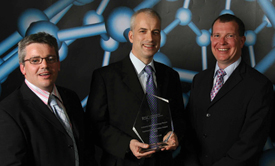Advertisement
Grab your lab coat. Let's get started
Welcome!
Welcome!
Create an account below to get 6 C&EN articles per month, receive newsletters and more - all free.
It seems this is your first time logging in online. Please enter the following information to continue.
As an ACS member you automatically get access to this site. All we need is few more details to create your reading experience.
Not you? Sign in with a different account.
Not you? Sign in with a different account.
ERROR 1
ERROR 1
ERROR 2
ERROR 2
ERROR 2
ERROR 2
ERROR 2
Password and Confirm password must match.
If you have an ACS member number, please enter it here so we can link this account to your membership. (optional)
ERROR 2
ACS values your privacy. By submitting your information, you are gaining access to C&EN and subscribing to our weekly newsletter. We use the information you provide to make your reading experience better, and we will never sell your data to third party members.
Synthesis
Inside Instrumentation
Technology and Business news for the laboratory world
by Celia H. Arnaud and Ann M. Thayer
May 28, 2007
| A version of this story appeared in
Volume 85, Issue 22
Royal Society Award For Prosonix, University Of Bath

\
Prosonix and the University of Bath, in the U.K., have won the Royal Society of Chemistry's 2006 Team Innovation Award for their particle engineering technology. Robert Price, lecturer in pharmaceutics at the University of Bath, discovered the process called SAX—solution, atomization, and crystallization by sonication. Prosonix is commercializing SAX technology for particle engineering in pharmaceutical applications. As an alternative to forming particles by milling or grinding, SAX can be used to crystallize particles with well-defined size ranges and morphologies directly from solution. Price (shown at left) received the award, along with Prosonix Chief Technical Officer Graham Ruecroft and CEO David Hipkiss.
Immunoassay analyzer family grows
Beckman Coulter has launched the newest member of its family of immunoassay analyzers. The UniCel DxI 600 Access Immunoassay System is designed for mid-volume laboratories, which the company estimates make up 45% of the worldwide immunodiagnostic testing market. All members of the UniCel family of immunoassay systems use the same reagent format. "The DxI 600 gives Beckman Coulter another immunoassay analyzer that will be combined with UniCel DxC chemistry systems, creating a broad range of work cells that will meet a variety of customer throughput requirements," says Richard Creager, corporate vice president, immunoassay business center.
Partners announce mass spec tools
Joint venture partners Applied Biosystems and MDS Sciex have added new proteomics and drug discovery tools to their product lineup. The 4800 Plus MALDI TOF/TOF mass spectrometer and a new version of ProteinPilot software are intended to improve the study of protein biomarkers by increasing throughput, providing broader proteome coverage, and giving better quantitative results. On the drug discovery side, the partners are launching what they believe to be the first commercially available system to combine MALDI with a triple quadrupole mass analyzer. They expect the new FlashQuant instrument to speed up analysis and increase the number of compounds that can be profiled during early-stage drug discovery.
PerkinElmer opens new headquarters
Celebrating 60 years of being based in Massachusetts, PerkinElmer has opened its new corporate headquarters and technology center in Waltham. Company executives and state and local dignitaries joined CEO Gregory L. Summe in touring the new center. The 115,000-sq-ft site includes an R&D facility for the company's drug discovery, cellular science, and diagnostics businesses. About 7% of the company's employees, nearly 600 people, work in Massachusetts.
ThalesNano debuts X-Cube flow reactor
ThalesNano, based in Budapest, Hungary, has launched a benchtop flow reactor system called the X-Cube. The reactor operates at temperatures up to 200 °C and pressures as high as 150 bar and is equipped with a catalyst and reagent cartridge system for conducting hazardous organic reactions. The company also can supply an autosampler with the system for combinatorial synthesis or process optimization experiments. ThalesNano was created in 2002 to develop microscale flow instruments for chemistry applications. It has also created a benchtop system called the H-Cube for carrying out enantio- and stereoselective catalytic hydrogenations.
JEOL joins team for brain imaging
(1) JEOL will work with researchers at Harvard University and the University of Southern California to construct a 3-D map of the brain from high-resolution scanning electron microscope images. The team, which includes Harvard biologist Jeff Lichtman and USC neuroscientist Kenneth Hayworth, plans to produce a 3-D image of the entire mouse brain. The research team will customize a JEOL JSM-7001FLV to allow fast acquisition of hundreds of thousands of sequential nanometer-scale images. The academic researchers are developing a tool called the automatic tape-collecting lathe-ultramicrotome, which will make ultrathin brain slices, embed them in a resin, and keep them for reconstruction mapping.
Inside Instrumentation is written by Celia H. Arnaud and Ann M. Thayer. Contact them via e-mail to instrumentation@acs.org.



Join the conversation
Contact the reporter
Submit a Letter to the Editor for publication
Engage with us on Twitter